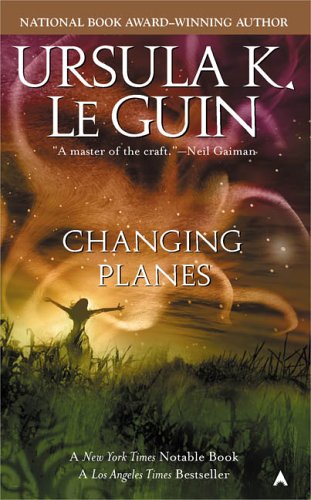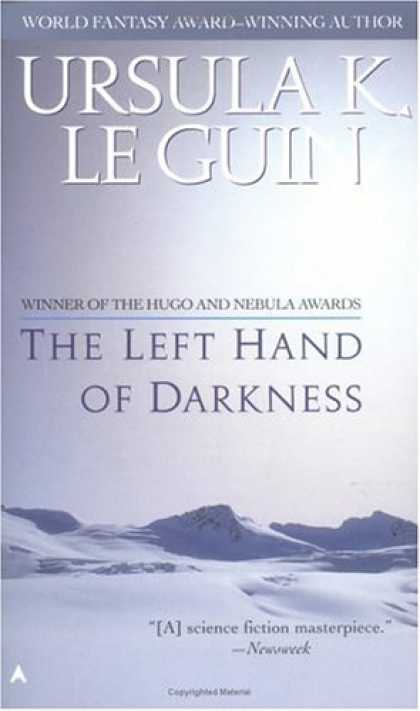 |
 |
Guest post written by Carissa Harwood.
In the past, the act of writing science fiction has been a traditionally male dominated genre. Women have sought to create their own meanings in the books they read that don’t often include their perspectives and experiences. In recent decades, though, women writers have searched for and taken control over a fiction category that seeks to shrink them, or exploit their gender for some statement, whether intentional or not, about the female body.
While times have certainly changed, and there are many fine science fiction writers, male and female, Ursula Le Guin stands out for me as a writer who has created new meanings for women in science fiction with seeming ease in her writing. She takes a simple concept — the ‘what if’ factor — and creates whole worlds that she populates as she gives us her answer. That’s the big golden key to science fiction writing — exploring the ‘what if’.
Here’s a ‘what if’ from her novel The Left Hand of Darkness — what if there was a planet where gender wasn’t so easily defined? What if there was a planet where men had the children, what would that be like? So often I’ve come across aspiring authors who request that I review their NEW FRESH EXCITING sci-fi novel, even though my blog explicitly states I no longer review new science fiction. And here’s the reason: the submissions (from male authors) I’ve read invariably read like this (I made this up as an example, this is not a direct quote from anywhere):
“Susie laughed manically as she switched Betty’s birth control pills with pez. ‘Now I can have Tommy all to myself’, she smirked.” There is a lot of smirking going on in these novels, and I hate the word smirk. It should be used sparingly. A smirk should be used to indicate a sarcastic smile, an I-know-something- you-don’t-know sing-song smile, and I’ve always associated the smirk with something teenagers like to do. And that is how many writers of science fiction write their female characters: smirking adolescents.
Science fiction is, or should be, a place to examine stereotypes and political and social conventions, not to reinforce them. Before Le Guin came along, we had authors like Piers Anthony (a notorious misogynist, although like most misogynists he denies that he is one) and Ray Bradbury. Now I wouldn’t go so far as to call Bradbury a misogynist — I admire Bradbury’s work, I really do, because many of his themes are universal. But he falls into the same trap that Stephen King does — very few of his main characters are female, and more often than not, men are the decision makers, and the ones that move the plot along. It’s interesting to note that many writers tend to write towards their own gender. In Bradbury’s fiction, like Anthony and King, the female characters often end up in supporting roles as wives, mothers, and crushes that turn into ‘marionettes’ or a controllable programmable robot that can be easily manipulated.
I read these books as a child and teenager, and I experienced a sense of dissatisfaction with the minor roles women were playing in this male literary playground. So I wondered what women writing science fiction would be like, and that’s where I found Ursula Le Guin, who didn’t merit her own displays in the library lobby like the other authors I’ve mentioned. At least, not when I was a kid.
Compare Bradbury’s marionettes and Anthony’s robot women to Le Guin’s character of Sita Dulip in Changing Planes. The main character is a woman who travels alone and fearlessly not only to other cities in the world, but other dimensions and other planets and cultures. She isn’t someone’s ‘female companion.’ She’s not defined by her marital status or her relationships or how many children she can or cannot produce. Not once does she ask anyone’s permission. Not once does she require a male guardian or escort. Not once does she require supervision. She just goes, because that’s what any thinking and curious person should be allowed to do without restriction—go forth and explore and learn and imagine. And she can do all this without one single mention of menstruation, (or mentioning having to pack tampons) or heartlessly abandoning her children in favor of a free life seeing what the universe has to offer. A woman can venture forth into the world (or worlds, in this case) without one single thought for her reproductive capabilities.
What’s so innovative about that? A woman traveling alone, doing what she wants? Because there’s no sense of fear, or intimidation or dependence on anyone else. Sita Dulip is truly a free individual. There’s no sense of loss, or not belonging anywhere. It’s simply a story of exploring and learning, without any literal or figurative baggage.
Let’s look at another comparison of science fiction as a way to explore deeply held social constructs by looking at John Scalzi’s brilliant take on The Ones Who Walk Away From Omelas, by Ursula Le Guin. He wrote about this as a lens through which to examine the Penn State scandal, and I had my students read this article when we discussed comparing literature to current events. The world she constructed in the novel goes like this: If you could have a happy wonderful, perfect life, but the price was that one child would have to live his or her life in misery, neglect and starvation for the rest of that child’s life—would you do it? Could you live your life knowing it took someone’s direct pain and misery? What happens to the people who stay? What happens to the people who walk away into an uncertain world?
It’s these kinds of questions that are explored through science fiction that really melt my butter. And I’m not saying–at all–that women can write science fiction better, I just want women to have an active voice, and active participation.
It’s the demand for participation in this world as something other than a reproductive vehicle that I wanted to find. Writing is a mental communication of ideas from the author’s brain to yours, a communication that, hopefully, journeys with you as you read along and create new possibilities and opportunities, challenging our perspectives and allowing us into the hearts and minds of the most diverse cast of characters you can imagine. All writing explores how we think, but fiction provides with a vehicle we can ride in. I just don’t think the vehicles should come in distinct shades of pink or blue with all their incumbent stereotypes. This can only happen if, and hopefully when, more women take up the pen to write their own stories, and seek to answer their own ‘what ifs’.
Carissa Harwood is an adjunct professor and writer of things rich and strange, from aliens to zombies, with some feminism, paranormal romance, and urban fantasy thrown into the mix. She holds a Masters of Fine Arts Degree in Playwrighting and blogs at 3500 Words per Pound.
